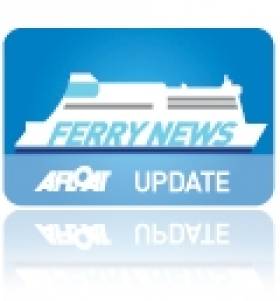Displaying items by tag: HSS Fast Craft
Stena's Diverse Fleet Shows Similarities on Irish Sea
#StenaSimilarities- Stena Line which operates services throughout Northern Europe including the Gothenburg-Frederikshavn route has seen the return to service of Stena Jutlandica, the ro-pax having undergone maintenance, writes Jehan Ashmore.
Last Saturday Stena Jutlandica (1996/29,691grt) resumed the 3 hour 15 minute Kattegat route between Sweden and Denmark. She strongly resembles Irish Ferries Isle of Inishmore (1997/34,031grt) which serves on the slightly longer 4 hour St. Georges Channel Rosslare-Pembroke route.
The reason for the design similarities is that Stena Jutlandica and Isle of Inishmore were both launched from Van der Geissen-de Noord, Rotterdam. The Dutch yard no longer exists.
During the four-day absence of 'Jutlandica', there was no replacement of the ferry, though route fleetmates Stena Danica (conventional ferry) and Stena Scanrail (train-ferry) provided additional sailings.
A fourth route ferry the Stena Carisma was only withdrawn from service earlier this year. The Westamarin built HSS 900 fast craft from Norway is a smaller version of the trio of Finnyards built HSS 1500 fast-craft.
The first of the revolutionary trio, Stena Explorer is unique in that she is the only HSS member left and of any fast-craft design ferry in the extensive company's fleet.
As previously reported, Stena Explorer is to resume Christmas period sailings on selected dates in December on the Dun Laoghaire-Holyhead route. In addition she is to operate some sailings in the New Year during early January.
Her former Irish Sea running mate, Stena Voyager became redundant on the North Channel's Belfast-Stranrear before a switch of Scottish terminal. Last year she was towed to Sweden where a subsidiary of the ferry company, Stena Recycling undertook dismantling the fast-craft ferry.
The third of the trio, Stena Discovery served on the longest route operated by a HSS craft, that been Harwich-Hook van Holland. She was sold to Venezuelan interests and the craft is understood to have never entered service.





























































